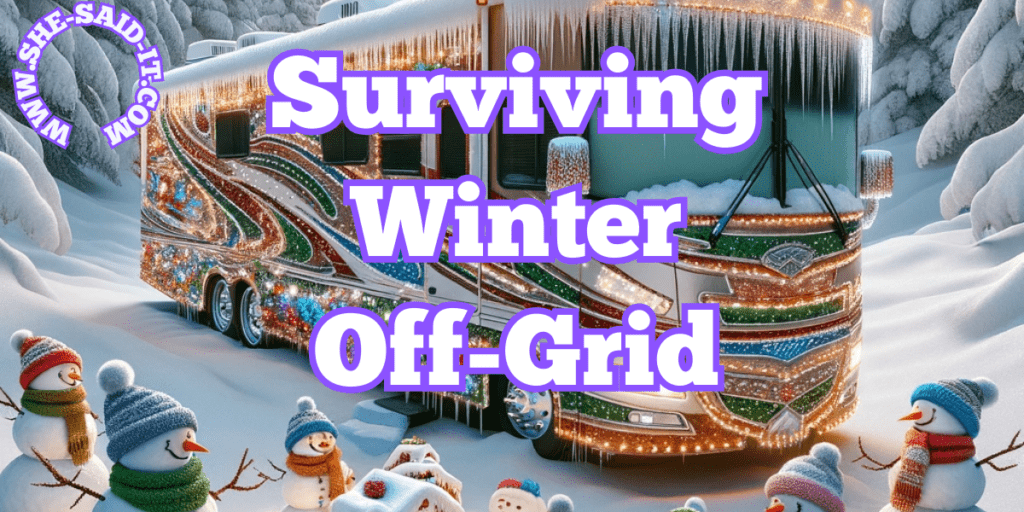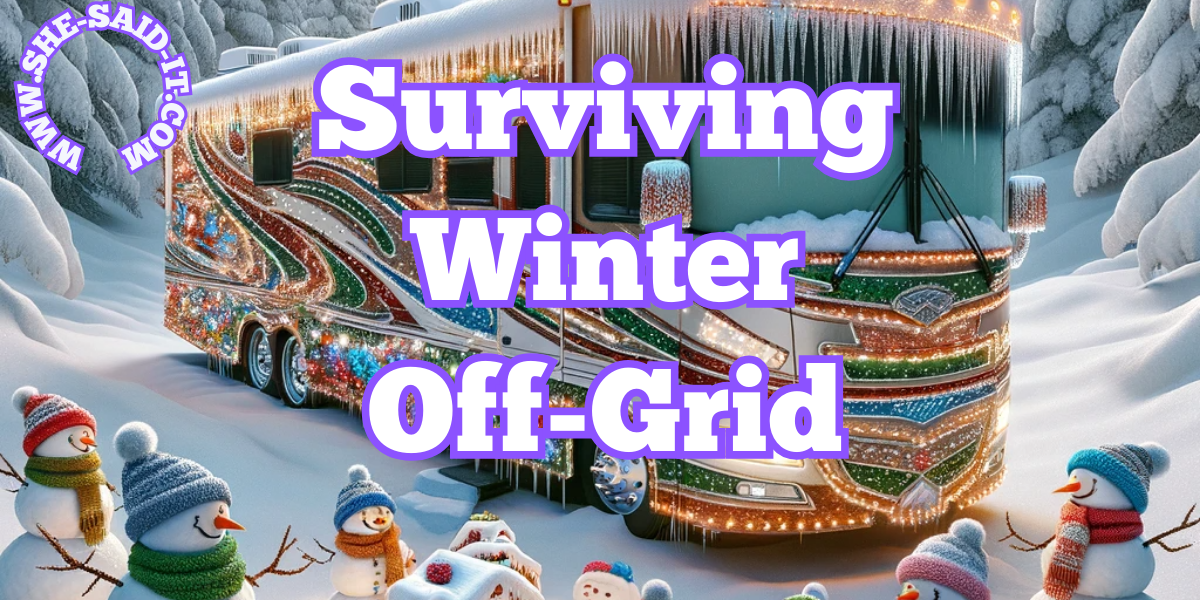Cold Comfort: Strategies for Surviving Winter Off-Grid
Welcome, fellow adventurers, to a tale of winter resilience in the off-grid world. This season, Mother Nature has graced us with a surprisingly mild touch, offering more gentle snowflakes than frostbitten mornings.
Living off-grid has taught me many things, but perhaps the most important lesson is respect for the unpredictability of winter. Like the time I woke up to an unexpected snowstorm in late March, after weeks of deceptive spring warmth. Or those quiet evenings when a sudden drop in temperature turned my well pump into an ice sculpture
These experiences have ingrained in me an invaluable sense of preparedness. Whether it’s keeping a heated mattress pad on all year or ensuring my RV’s insulation can stand up to a sudden cold snap, being ready for winter’s whims is a cornerstone of off-grid living(check out our related post about Geothermal Heating and cooling). Here’s a blog post I wrote about heated mattress pads.
So, as we enjoy this milder wild season, let’s not forget the power of winter. It can be a serene, snow-laden wonderland one day and a challenging, icy landscape the next. In this journey of embracing the cold comfort of winter off-grid (check out our related blog post about affordable alternative housing), let’s gear up for all the possibilities this season may still have in store for us.
Section 1: Understanding Winter’s Unpredictability
Weather Patterns
The unpredictability of winter, particularly in off-grid settings, can be both awe-inspiring and daunting. Unlike urban areas, where weather changes are more moderated, off-grid locations are often at the mercy of nature’s full spectrum. Here, weather patterns don’t just shift; they transform. A clear sky can rapidly darken, ushering in a swift snowstorm or an unexpected drop in temperature.
This volatility is not just about the immediate discomfort it might cause. It significantly impacts our daily living – from the way we manage our water supply to how we generate power. Solar panels, for instance, are less efficient under heavy cloud cover, and snow accumulation can require frequent clearing.
Surviving a Canadian Winter: Alberta Battles
Spending a winter in my RV in Alberta was an exercise in resilience and adaptability, marked by the kind of cold that makes you truly appreciate a warm blanket. With temperatures dropping to -40 degrees, it was a winter that tested my limits and taught me a few things about living in extreme conditions and I had power.
The lack of running water was one of the first challenges I encountered. Each drop of water had to be carefully considered and conserved, turning routine tasks into exercises in resource management. It was a stark reminder of the conveniences we often take for granted and a lesson in making do with less. The pipes in side my RV were fine, I just couldn’t get water into my onboard tank to begin with.
The saving grace in this situation was my heated blanket. It kind of goes agaisnt being off grid to use and electric appliance to keep warm, but a portable power bank and a heated blanket for when you are getting into bed can be a major game changer. Read my review of the one I bought by clicking this link.
Snow management was a constant task. Clearing snow off the slides and roof, often in the dark, was no small feat. It was physically demanding work, yet there was something almost meditative about it – just me and the vast, silent expanse of winter around me. Winter is so quiet.
Despite the challenges, there was a certain satisfaction in navigating through the winter. It wasn’t easy, but it was definitely manageable. Each day brought its own set of tasks and triumphs, reinforcing the idea that with the right mindset and preparations, even the most daunting winters can be more than just endured – they can be lived well.
This winter experience in Alberta was not just about surviving the cold; it was about discovering new strengths and finding joy in the simplicity and quiet of winter living.
Section 2: Essential Preparations for a Sudden Winter Shift
Insulation and Heating
Keeping your RV warm during sudden temperature drops is critical. Here are some effective strategies for surviving winter off-grid(check out our related post about repelling rodents):
- Upgrade Insulation: Enhance your RV’s insulation with foam boards, reflective foil, or thermal curtains. Pay special attention to windows and doors, where heat loss is most significant.
- Portable Heaters: Invest in a reliable portable heater. Propane heaters are popular, but always ensure proper ventilation to prevent condensation and carbon monoxide buildup. Read my article about my Diesel Heater here.
- Seal Gaps: Check for drafts and seal any gaps with weather stripping or caulking. Even small leaks can significantly reduce your RV’s warmth.
- Skirt Your Rig: RV skirting can make a huge difference in the winter months. Most RV’s have thin flooring and stopping the wind flow beneath your rig is a great start, placing a heat source beneath is even better.
Emergency Supplies
When a winter storm hits unexpectedly, these supplies can be a lifesaver:
- Non-perishable Food and Water: Stock up on canned goods, dried foods, and sufficient water supply.
- First-Aid Kit: Keep a well-stocked first-aid kit, including medications you might need.
- Extra Blankets and Warm Clothing: Have enough blankets and warm clothes, including hats, gloves, and thermal socks.
- Backup Power Source: A generator or extra batteries can be crucial if your main power source fails.
- Snow Removal Tools: Keep a shovel and ice scraper handy for sudden snow accumulation. It’s important to keep snow off slide covers and your roof. The weight and ice accumulation can be problematic.
Energy Management
With shorter days and longer nights, managing your energy resources becomes even more important:
- Solar Power Adjustments: If you use solar panels, keep them clear of snow and angled to capture the most sunlight.
- Conserve Electricity: Use LED lighting and energy-efficient appliances. Turn off and unplug electronics when not in use.
- Battery Care: Keep your batteries warm and insulated to prevent them from losing charge quickly in cold temperatures.
- Plan Your Energy Use: Prioritize energy usage for essential needs like heating and cooking, especially during periods of limited sunlight.
These preparations can make a significant difference in comfortably and safely navigating the challenges of a sudden winter shift off-grid.
Section 3: Staying Safe and Warm
Clothing and Bedding
When a cold snap hits, especially during off-grid winter camping, the right clothing and bedding are your first line of defense:
- Layering: Start with moisture-wicking base layers to keep dry, add insulating layers for warmth, and finish with a waterproof outer layer for protection against snow and rain.
- Quality Footwear: Insulated, waterproof boots are a must. Pair them with wool or thermal socks.
- Bedding: Opt for a four-season sleeping bag rated for low temperatures. Consider adding a sleeping bag liner for extra warmth.
- Insulating Your Bed: Place a foam pad or insulated mat under your sleeping bag to minimize heat loss to the ground.
Health Considerations
Staying healthy and preventing hypothermia is crucial in cold conditions:
- Recognize Hypothermia Signs: Be aware of shivering, slurred speech, and clumsiness, which are early signs of hypothermia. Immediate action is required, like getting into warm clothes and consuming warm, non-alcoholic beverages.
- Stay Dry: Wet clothing loses its insulating properties and increases the risk of hypothermia. Change out of wet clothes as soon as possible.
- Nutrition and Hydration: Eat high-energy foods and stay hydrated to help your body generate heat.
- Regular Check-ins: When camping off-grid, it’s vital to inform someone about your whereabouts and planned route. Regular check-ins ensure that in case of an emergency, help knows where to find you.
Winter camping off-grid can be a safe and exhilarating experience, but it demands respect for nature’s unpredictability. A sudden storm can quickly change the scenario, and being prepared is not just about comfort, but survival. With the right gear and precautions, you can enjoy the serene beauty of winter, confidently knowing that you’re well-equipped to handle any surprises it may bring.
Section 3.5: Universal Strategies for Winter Living
While the focus here is on surviving winter off-grid, the strategies discussed are relevant for a variety of winter living situations. Whether you’re caring for a homestead, clearing snow off your RV, or embarking on a winter hike, these principles hold true:
Adapting Clothing and Bedding for All Scenarios
- Homestead Care: If you’re managing a homestead in winter, layering remains key. Durable, waterproof outerwear is essential for outdoor tasks.
- RV Maintenance: When clearing snow off your RV, wear insulated gloves and a warm hat. Moisture-wicking layers help as you exert yourself physically.
- Hiking and Outdoor Activities: Choose breathable, moisture-wicking fabrics that keep you warm yet allow sweat to escape during strenuous activities.
Health Considerations Across Different Winter Environments
- Homestead: Regularly clearing paths and checking on outdoor equipment can be physically demanding. Dress appropriately and stay hydrated.
- RV Living: In confined spaces like an RV, humidity can build up, leading to damp conditions. Ventilation is crucial to prevent mold and maintain a healthy environment.
- Hiking: Always carry a thermal blanket and a portable heat source. If you’re venturing into remote areas, a GPS tracker or a method of communication is vital for safety.
General Winter Preparedness
Regardless of the winter activity or living situation, certain preparations are universally important:
- Emergency Supplies: Whether you’re at a homestead, in an RV, or out hiking, keep an emergency kit with essentials like food, water, a first-aid kit, and a reliable source of heat.
- Weather Awareness: Stay updated on weather forecasts. Sudden changes in weather can impact all aspects of winter living, from homestead maintenance to outdoor safety.
- Regular Communication: Keep in touch with someone who knows your plans and location. This is crucial whether you’re living off-grid, maintaining a homestead in a remote area, or hiking through winter landscapes.
In every type of winter living situation, the key lies in preparation, awareness, and adaptability. The beauty of winter can be fully appreciated when we’re well-prepared for its challenges, whether it’s in the tranquility of a homestead, the compact warmth of an RV, or the crisp air of a winter trail.
Section 4: The Other Side of Winter: Dealing with Mild Season’s Curveballs
Unexpected Thaws
Mild winters bring their own set of challenges, often overlooked when compared to the harshness of a typical cold season:
- Mud and Melting Snow: With the ground frequently freezing and thawing, conditions can quickly become muddy and slippery. This is particularly troublesome around your RV or homestead, where it can lead to mobility issues. Ensure you have appropriate footwear and perhaps lay down some gravel or wood chips for more stable footing.
- Potential Flooding: Snowmelt combined with rain can lead to unexpected flooding, especially in low-lying areas. Keep an eye on weather forecasts and be prepared to move your RV to higher ground if necessary. For homesteads, ensure proper drainage around your property to mitigate flooding risks.
Wildlife Activity
Milder winters can significantly alter the behavior of wildlife, which can impact your off-grid living:
- Increased Activity: Animals that might typically hibernate or reduce activity in colder months may remain active. This can lead to increased sightings of wildlife around your RV or homestead.
- Food Sources: With less snow covering the ground, wildlife might roam closer to human habitats in search of food. Be cautious about leaving food items outside that could attract animals.
- Safety Precautions: While wildlife encounters can be a delightful aspect of off-grid living, always maintain a respectful distance and never attempt to feed wild animals. Be aware of your surroundings, especially when hiking or engaging in outdoor activities.
Mild winters, with their unpredictable thaws and unique wildlife behaviors, require a different set of strategies and precautions. By staying alert to these changes and adapting accordingly, you can ensure a safe and enjoyable off-grid living experience, even during an unusually mild winter season.
Section 5: Nurturing Your Inner Warmth: Mental Health in Winter Off-Grid
Coping with Uncertainty
The fluctuating nature of a mild winter season can pose unique mental challenges. The unpredictability can sometimes feel akin to the eerie unpredictability in Stephen King’s “The Shining,” where the weather plays a pivotal role in the story’s suspense and tension. While our off-grid experiences are far from a horror novel, the analogy stands – unpredictability can be mentally taxing.
- Embrace Flexibility: Learn to adapt to changing conditions. Flexibility in your daily routine can help you manage unexpected weather shifts.
- Stay Prepared: Being prepared for various scenarios can provide a sense of control and peace of mind. Knowing you have contingencies in place can greatly reduce anxiety.
- Connect with Others: Share experiences and tips with fellow off-gridders. A shared problem often feels more manageable and less isolating.
Staying Positive
Maintaining a positive outlook is key to enjoying the winter season, regardless of its whims:
- Find Joy in the Small Things: Whether it’s the beauty of a frost-covered tree or the coziness of a warm blanket, focusing on the simple pleasures can lift your spirits.
- Stay Active: Engaging in physical activities, be it a brisk walk or some indoor exercises, can boost your mood and energy levels.
- Creative Outlets: Take up a hobby like knitting, writing, or photography. Creative activities are not only therapeutic but also a productive way to spend time indoors during less favorable weather.
- Plan for the Future: Use this time to plan future adventures or projects. This forward-thinking approach can keep you motivated and excited about what’s to come. This is how I spent the past 3 winters, planning my escape to Mexico.
When it comes to surviving winter off-grid, where each day can bring a new challenge, it’s vital to nurture your mental and emotional well-being. By acknowledging and addressing the mental challenges and focusing on positivity, you can turn even the most fluctuating winter season into an enriching and enjoyable experience.

Section 6: Navigate Winter with These Online Tools and Communities
In today’s digital age, a plethora of online resources are available at your fingertips, providing additional support and information:
- Forums and Social Media Groups: Platforms like Reddit or Facebook have numerous groups and forums dedicated to off-grid living, RV maintenance, and winter survival tips. These are great spaces to ask questions, share experiences, and stay updated on the latest in off-grid living.
- Weather Apps and Websites: Reliable weather apps are a must-have. They provide timely updates and forecasts, helping you stay one step ahead of the weather. Apps like The Weather Channel, AccuWeather, or local weather station apps can be incredibly useful.
- Blogs and YouTube Channels: Many off-gridders document their experiences through blogs or YouTube channels. These can be a goldmine of information, offering everything from DIY guides to personal anecdotes about managing the challenges of winter living.
Remember, while the off-grid lifestyle champions independence, it doesn’t mean going it alone. The community, both physical and virtual, can be a vital support system, enriching your off-grid experience and helping you navigate the challenges of winter living with greater ease and confidence.
In summary, surviving and thriving in an unpredictable winter, especially when living off-grid, hinges on several key factors:
- Knowledge and Skills: Understanding how to manage your resources, such as heating and food supplies, is vital. Knowledge of basic repairs and maintenance of your living space can be lifesaving in harsh conditions.
- Adequate Supplies: Ensuring you have enough provisions, including food, water, and medical supplies, is crucial. This also includes having the right clothing and equipment to stay warm and safe.
- Energy Management: Whether it’s fuel for heating or power for your electrical needs, efficient energy management is a cornerstone of winter survival. Renewable energy sources, like solar panels, can be particularly useful.
- Community Support: Building relationships with nearby residents or fellow off-gridders can create a support network for sharing resources, skills, and information.
- Embracing the Experience: While challenging, winter can also be a time of profound beauty and tranquility. Learning to appreciate the unique aspects of this season can enhance your off-grid living experience.
In concluding, the importance of preparedness cannot be overstated. The unpredictable nature of winter, especially when it comes to surviving winter off-grid, demands a level of resilience and adaptability. However, the rewards of this lifestyle are plentiful. There’s a unique beauty in off-grid living during the colder months – the serene landscapes, the quiet, and the satisfaction of self-sufficiency. It’s not just about enduring the winter but embracing it as a vital and enriching part of the off-grid experience. This journey, with all its challenges and rewards, offers an unparalleled opportunity to connect with nature, foster personal growth, and appreciate the simple yet profound joys of life.
Your Turn: Share Your Tips for Surviving Winter Off-Grid
As we close the chapter on our discussion of winter off-grid living, I invite you to open a new one by sharing your own experiences and insights. Whether it’s a clever tip that’s served you well during cold snaps, a heartwarming story from your winter adventures, or a challenge you’ve overcome, your contributions enrich our collective knowledge and spirit of adventure.
In the comments below, feel free to share your personal winter survival tips and stories. How have you adapted to the unpredictability of the season? What lessons has living off-grid taught you about embracing the colder months? Your narratives are not just stories; they’re the wisdom and inspiration that fuel our community.
Looking ahead, stay tuned for more posts delving deeper into the off-grid lifestyle. We’ll explore everything from sustainable living practices to detailed guides on RV maintenance, and of course, more insights into seasonal living – because every season brings its own set of adventures and learning opportunities.
Your engagement and stories are what make this community vibrant and resourceful. So, let’s keep the conversation going – share your winter tales and tips, and let’s continue to learn and grow together in our off-grid journey. Here’s to the many winters we’ve weathered and the many more we’ll embrace with confidence and enthusiasm!





